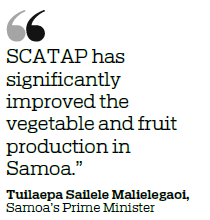Samoan farmers reap fruits of agricultural tech aid project
APIA, Samoa - On a sunny afternoon, John Maposua, one of 100 Samoan model farmers trained under a China-aid agricultural project, checks the growth of a football-shaped eggplant on his 10-acre farm at Aleasa village near the Samoan capital of Apia.
"These eggplants will be sold to local hotels and restaurants immediately after they're mature," Maposua said, adding that he is grateful for the Chinese experts that mentored him on how to grow high-quality vegetable seeds.
"I've been a farmer here for 30 years," Maposua added. "Previously I grew eggplants but could hardly sell them for a good price. Now, using seeds from Chinese experts, my farm produce is in great demand in Apia."
Maposua and other Samoan farmers are literally reaping the fruits of the Samoa-China Agricultural Technical Aid Project. Initiated in 2010, the project was designed to help Samoan farmers enhance their sustainable livelihoods.
China sent experts to Samoa to set up demonstration farms so locals could learn how to increase productivity and promote sustainable agriculture.
SCATAP has proven to be successful and was dubbed as one of "the most successful" Chinese projects overseas. By introducing high-quality seeds, facilities and technologies from China, agricultural production in Samoa has greatly improved.

"Compared to Chinese crop varieties, local vegetables and fruits like cucumbers are much smaller and less expensive," said Liu Zhiwen, senior agronomist and team leader of SCATAP.
Statistics show about two-thirds of all households in Samoa depend on a mixture of subsistence agriculture and cash crops, which makes up more than 10 percent of the country's GDP and 70 percent of its labor force. Most Samoans grow food crops for home consumption and cash crops for export.
However, the impact of severe climate change and old-fashioned agricultural skills has dragged down Samoan farmers' pursuit of a more sustainable and well-off lifestyle.
Data also show that Samoa's imports of agricultural products account for one-fourth of total imports of the country in the last few years, including rice, wheat, sugar, vegetable and fruits.
Sponsored by the Chinese government, Hunan Provincial Agricultural Foreign Economic Cooperation Center was tasked to implement the project with the Samoan government.
Experts found the Chinese small or medium-scale agricultural production skills are suitable for Samoa, and that some machinery can also be used for plowing, planting and harvesting.
"Samoa's agriculture sector will be more profitable with new techniques and knowledge in farming applied," Liu said. "Their output will be greatly improved."
"The experts of this project gave us some of the experiences that we didn't know before, from the solving of seeds to how to cultivate lands," added Keneti Leavasa, a senior expert of the Crops Division of the Samoan Ministry of Agricultural and Fisheries.
"Our farmers used to just plant, but did not cultivate the land properly. They provided us experiences and skills not only for the vegetables, the crops but also for lifestyles," Leavasa said.
Liu also hoped that his "students" can share what they have learned with the people of neighboring Pacific island countries in the future.
China has provided a total of $6 million for the project that is divided into four phases, with Phase Four launched in June 2017 and nine Chinese agricultural experts assigned to work in the island nation for three years through 2020.
According to the Chinese experts, the demo farms are now growing more than 40 varieties of crops for testing, 15 of which have been registered by Samoan authorities. Through the project, modern agricultural technology facilities on greenhouse cultivation, high-yield fruit cultivation, organic fertilizer and soil improvement were set up.
The Hunan center has also established nine agricultural stations and provided agricultural training for more than 7,000 farmers.
Maposua is a trainee of the project. "We need China's support," he said, hoping that Chinese experts will stay to teach them more new techniques.
Samoa's Prime Minister Tuilaepa Sailele Malielegaoi said during the inauguration of Samoa Corp Variety Trial Station at a demo farm in late October that growing their own vegetables and fruits makes Samoa less dependent on imported fresh products.
"SCATAP has significantly improved the vegetable and fruit production in Samoa," Tuilaepa said.
"The contribution of this project to our economy and the livelihood of the people of Samoa, particularly our farmers and communities, is key. It contributes to achieving our goal of a healthy, productive and sustainable agriculture for Samoa."
Tuilaepa lauded SCATAP, saying the project is a successful example of South-South cooperation between China and Pacific island countries like Samoa.
Samoans are greatly benefiting from the Belt and Road Initiative through the project, said the SCATAP team leader Liu, quoting a Chinese proverb "give a man a fish and you feed him for a day; teach a man how to fish and you feed him for a lifetime".
Xinhua
(China Daily 11/14/2019 page17)














